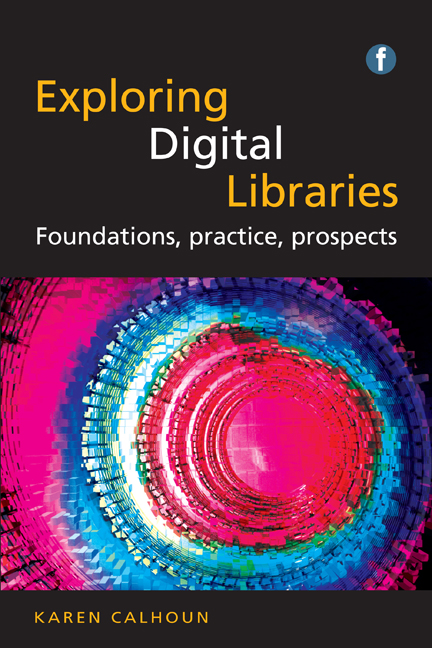Book contents
- Frontmatter
- Dedication
- Contents
- List of figures and tables
- Preface
- Acknowledgements
- Glossary
- 1 Emergence and definitions of digital libraries
- 2 Outcomes of digital libraries’ first decade
- 3 Key themes and challenges in digital libraries
- 4 Digital library collections: repositories
- 5 Hybrid libraries
- 6 Social roles of digital libraries
- 7 Digital libraries and their communities
- 8 The prospects of open access repositories
- 9 Digital libraries and the social web: scholarship
- 10 Digital libraries and the social web: collections and platforms
- References
- Index
- Frontmatter
- Dedication
- Contents
- List of figures and tables
- Preface
- Acknowledgements
- Glossary
- 1 Emergence and definitions of digital libraries
- 2 Outcomes of digital libraries’ first decade
- 3 Key themes and challenges in digital libraries
- 4 Digital library collections: repositories
- 5 Hybrid libraries
- 6 Social roles of digital libraries
- 7 Digital libraries and their communities
- 8 The prospects of open access repositories
- 9 Digital libraries and the social web: scholarship
- 10 Digital libraries and the social web: collections and platforms
- References
- Index
Summary
Overview
This chapter continues the discussion of digital collections with a detailed look at the interplay between library users, hybrid library collections and enabling technologies for hybrid library systems and services. Hybrid library collections contain non-digital, digitized and born-digital resources. This chapter examines changing information-seeking behaviors and preferences, explores how they have fostered new collections strategies, and analyses the impact of both on discovery services and other enabling technologies for hybrid libraries. The chapter ends with some thoughts about the parallel but separate evolutionary paths of hybrid libraries, repositories and the web.
Changing information-seeking behaviors
Information moves online
The content of interest to those who use libraries is highly distributed across the web. Vast changes have occurred not only in the amount of information available but also where people prefer to look for what they need. Library collections exist alongside (and compete for attention with) many other choices for information seekers, including those for whom hybrid library collections are or would be useful.
Digital formats are beginning to dominate library collections, especially in academic libraries. Particularly with respect to the scholarly journal literature, library collections are already digital collections, and online formats are preferred. As discussed in Chapter 2, by 2001 a third of faculty and half of students reported they were relying exclusively or almost exclusively on online scholarly resources for their work (Friedlander, 2002). More than a decade later, preferences for web-based scholarly content are much stronger.
Research on information-seeking behaviors
preferred sources of information
The attention of both the general public and academics has shifted rapidly to online networked content. Many people now prefer to look for information online, and most segments of the population place a high value on immediately available, convenient online sources, often preferring these sources over hybrid library collections. Much research has been focused on these trends, for example the following studies:
• The American public. According to a survey of people's perceptions of libraries and preferences for information discovery conducted by Harris Interactive on behalf of OCLC, 84% of surveyed Americans say they prefer to begin a search for information with a search engine. Furthermore, a majority (69%) of American respondents considered the information they find on the web to be as trustworthy as information from a library (De Rosa et al., 2011, 32, 40).
- Type
- Chapter
- Information
- Exploring Digital LibrariesFoundations, Practice, Prospects, pp. 111 - 138Publisher: FacetPrint publication year: 2014



